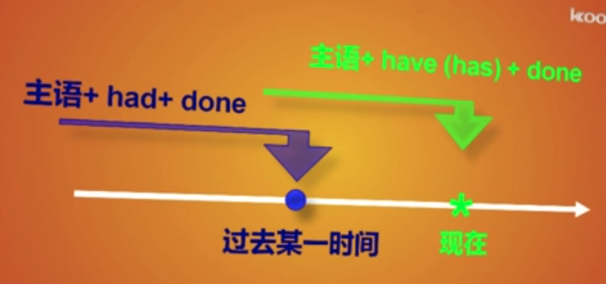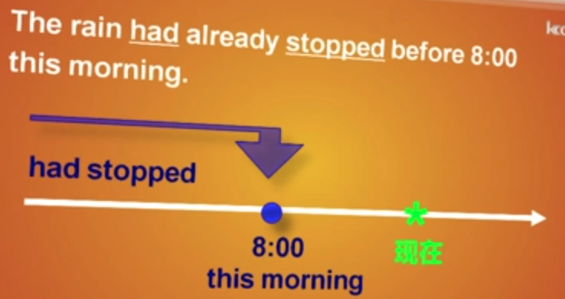时态是英语非常重要的概念,共有16种时态,分为一般现在时(do),一般过去时(did),一般将来时(will do),现在进行时(is/am/are doing),过去进行时(was/were doing),将来进行时(可与一般将来时换用,will be doing),现在完成时(have/has done),过去完成时(had done),发生在一般过去时的动作之前),将来完成时(will have done),现在完成进行时(have/has been doing),过去完成进行时(had been doing),将来完成进行时(will have been doing),过去将来时(would do),过去将来进行时(would be doing),过去将来完成时(would have done),过去将来完成进行时(would have been doing)等。
时态结构
| 时态 | ||
|---|---|---|
| 时间 | 状态 | |
| 过去 | 一般 | |
| 现在 | 进行 | |
| 将来 | 完成 |
时态由时间和状态构成,各种不同的时间和状态组合
一、1个时间和1个状态组合
| 过去 | 现在 | 将来 |
|---|---|---|
| 一般过去(did) | 一般现在(do) | 一般将来(will do) |
| 过去进行(was/were doing) | 现在进行(is/am/are doing) | 将来进行(可与一般将来时换用,will be doing) |
| 过去完成(had done) | 现在完成(have/has done) | 将来完成(will have done) |
二、完成进行时
| 过去 | 现在 | 将来 |
|---|---|---|
| 过去完成进行时(had been doing) | 现在完成进行时(have/has been doing) | 将来完成进行时(will have been doing) |
a. 现在完成进行时(have/has been doing)
例:We have been working on this project for over a month now.
b. 过去完成进行时(had been doing)
例:He had been working in a factory for years before he got this job.
c. 将来完成进行时(will have been doing)
例:Soon the astronauts will have been working on it for seven days.
这3种完成时态,是完成时态下强调进行,看起来时二级时态,这3个时态跟其他完成时态的对应关系:
| / | 进行 |
|---|---|
| 现在完成(have/has done) | 现在完成进行时(have/has been doing) |
| 过去完成(had done) | 过去完成进行时(had been doing) |
| 将来完成(will have done) | 将来完成进行时(will have been doing) |
tips: have/has/had been done 这个是完成时态的被动语态,不是一个新的时态
三、过去将来时
a. 过去将来时(would do)
例:She told us that she would not go with us if it rained.
b. 过去将来进行时(would be doing)
例:The government promised that a new highway would be being built next July.
c. 过去将来完成时(would have done)
例:I believed by the end of that year an advanced version of that software would have been developed, but I was wrong.
d. 过去将来完成进行时(would have been doing)
例:They said that by the end of the following month, the project would have been being worked for 3 years.
上述4种过去将来时态,我看了一些例子,基本上全部是宾语从句或者if条件句用的,宾语从句的主句部分时过去式,从句的will都变为would。所以这4种时态不需要特别注意,看起来是二级的时态。这4个时态跟其他时态的对应关系:
| will | would |
|---|---|
| 一般将来(will do) | 过去将来时(would do) |
| 将来进行(will be doing) | 过去将来进行时(would be doing) |
| 将来完成(will have done) | 过去将来完成时(would have done) |
| 将来完成进行时(will have been doing) | 过去将来完成进行时(would have been doing) |
一般现在时
何时用?
可以表示:1、经常的状态;2、习惯的动作;3、真理
结构
| 种类 | 结构 | 例句 |
|---|---|---|
| 经常的状态 | 主语 + is/am/are | They are very bad. |
| 习惯的动作 | 主语 + v.(动词) | They often cheat in the exams |
| 真理 | 主语 + is/am/are | The earth is round |
| 真理 | 主语 + v.(动词) | The sun rises in the east. |
动词变化
一般现在时主语 + v.(动词) 的句式中,要区分是否三单
-
主语为非三单 + 动词原形
例:
He loves his girfriend very much.例:
My doy watches TV at night.例:
Jim and Lily wakl to school every day. -
主语为三单 + 动词s/es
例:
Jim and Lily walk to school every day.例:
They drink beer every night.转疑问句
- be动词可直接提前
- 实义动词需要借do/does
He is an IT worker.
->
Is he an IT worker?
They drink beer every night.
->
Do they drink beer every night?
He loves his girfriend very much.
->
Does he loves his girfriend very much?
转否定句
- be动词加not,可缩写
- 实义动词需要借don’t/doesn’t
He is an IT worker.
->
He isn't an IT worker.
They drink beer every night.
->
They don't drink beer every night.
He loves his girfriend very much.
->
He doesn't loves his girfriend very much.
现在进行时
何时用?
表示此时此刻正在做的状态
结构
主语 + Is/Am/Are + doing
They are walking.
动词变化
-
一般 + ing
例:
They are walking. -
以不发音的e结尾,去e + ing
例:
She is typing a letter. -
辅+元+辅(汉堡包结构),双写辅音字母+ing,除了opening这个例外
例:
He is swimming across the river.转疑问句
主语 + Is/Am/Are + not + doing?
They are walking.
->
Are they walking?
转否定句
Is/Am/Are + 主语 + doing?
They are walking.
->
They are not walking.
现在完成时
何时用?
-
截止现在已经完成的行为
I have aired the room. -
表示持续
They have lived in Beijing for ten years.结构
主语 + has/have + done
动词变化
-
一般情况 + ed
例:
call->called, air->aired -
以e结尾,+d
例:
live->lived, love->loved -
以辅音字母y结尾,变y为i+ed
例:
try->tried, study->studied -
辅+元+辅(汉堡包结构),双写辅音字母+ed
例:
stop->stopped转疑问句
Has/Have + 主语 + done?
He has aired the room.
->
Has he aired the room?
转否定句
主语 + has/have + not + done
He has aired the room.
->
He has not aired the room?
一般过去时
何时用?
-
过去经常的状态
-
过去习惯的动作
结构
种类 | 结构 | 例句 —- | —- | —- 过去经常的状态 | 主语 + was/were | I studied in the US in 2010. 过去习惯的动作 | 主语 + v.(动词过去式)|
动词变化
-
一般情况 + ed
例:
call->called, air->aired -
以e结尾,+d
例:
live->lived, love->loved -
以辅音字母y结尾,变y为i+ed
例:
try->tried, study->studied -
辅+元+辅(汉堡包结构),双写辅音字母+ed
例:
stop->stopped转疑问句
was/were + …? Did + … + 动词原形…?
There was a very big race.
->
Was there a very big race.
I answered the phonoe.
->
Did I answer the phonoe?
转否定句
was/were + not didn’t + 动词原形
There was a very big race.
->
There was not a very big race.
I answered the phonoe.
->
I didn't answer the phone.
过去进行时
何时用?
过去某一时刻、时段正发生的动作
结构
主语 + was/were + doing
She was doing her homework at 10:00 last night.
They were having a date from 7:00-9:00 yesterday.
动词变化
参加一般进行时
转疑问句
was/were + …?
She was doing her homework at 10:00 last night.
->
Was she doing her homework at 10:00 last night.
转否定句
was/were + not
She was doing her homework at 10:00 last night.
->
She was not doing her homework at 10:00 last night.
过去完成时
何时用?
再过去某一时刻之前,已经完成的动作、状态
如图:绿色是现在完成时,蓝色是过去完成时

例句
The rain had already stopped before 8:00 this morning.

结构
主语 + had + done
She had done her homework before 10:00 last night.
动词变化
参加现在完成时
转疑问句
Had + …?
She had done her homework before 10:00 last night.
->
Had she done her homework before 10:00 last night?
转否定句
had + not
She had done her homework before 10:00 last night.
->
She had not done her homework before 10:00 last night.
一般将来时
何时用?
将来的动作、行为
结构
-
主语 + is/am/are + going to
用于表示:客观、马上、预先的计划
It's going to be fine tomorrow. the woman is goint to talk to you. -
主语 + will/shall + v.
I will be late. He will come on time.
动词变化
无变化,使用原型
转疑问句
will/is/am/are + …?
It's going to be fine tomorrow.
->
Is it going to be fine tomorrow.
I will be late.
->
Will I be late?
转否定句
will/is/am/are + not
It's going to be fine tomorrow.
->
It is not going to be fine tomorrow.
I will be late.
->
I will no be late.
过去将来时
何时用?
结构
-
主语 + was/were + going to
-
主语 + would + v.
He was 20 years old at that time. In three years, he would be 23 years old.
He told me he would come to Beijing.
动词变化
无变化,使用原型
转疑问句
will/is/am/are + …?
It's going to be fine tomorrow.
->
Is it going to be fine tomorrow.
I will be late.
->
Will I be late?
转否定句
will/is/am/are + not
It's going to be fine tomorrow.
->
It is not going to be fine tomorrow.
I will be late.
->
I will no be late.